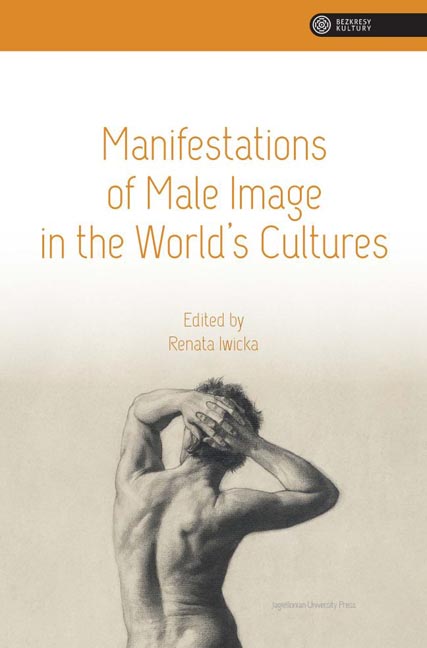Book contents
- Frontmatter
- Contents
- Preface
- “A Jewel Beyond Compare”: Prince Hikaru Genji As A Perfect Male Of The Heian Period In The Light Of Popular Culture Theories
- Cicero and Male Virtue
- Kill The Savage, Save The Man – James Welch’s Chronicle Of Native American History
- On (Self-)Representations Of Masculinity In Siyāmak Herawi’s Short Stories
- Power, Masculinity, And War: Superman, A Case Study
- Redefining New Masculinity In Korean Television Drama Series
- Stripping The Vampire. Erotic Imaginations and Sexual Fantasies In Paranormal Romances (A Study Of Selected Examples)
- The Horned God: Divine Male Principle In British Traditional Wicca
- Biographical Notes of the Authors
- Miscellaneous Endmatter
The Horned God: Divine Male Principle In British Traditional Wicca
Published online by Cambridge University Press: 14 October 2023
- Frontmatter
- Contents
- Preface
- “A Jewel Beyond Compare”: Prince Hikaru Genji As A Perfect Male Of The Heian Period In The Light Of Popular Culture Theories
- Cicero and Male Virtue
- Kill The Savage, Save The Man – James Welch’s Chronicle Of Native American History
- On (Self-)Representations Of Masculinity In Siyāmak Herawi’s Short Stories
- Power, Masculinity, And War: Superman, A Case Study
- Redefining New Masculinity In Korean Television Drama Series
- Stripping The Vampire. Erotic Imaginations and Sexual Fantasies In Paranormal Romances (A Study Of Selected Examples)
- The Horned God: Divine Male Principle In British Traditional Wicca
- Biographical Notes of the Authors
- Miscellaneous Endmatter
Summary
Abstract: The duotheistic approach to divinity has been visible in British Traditional Wicca since its inception – that is, worshipping two complementary principles, female and male, a passive and fertile Goddess alongside an active and fertilising God. The aim of this paper is to provide an insight into the God in his four aspects: mainly the Horned One, but also Lord of Death, Oak and Holly King, Green Man. Basing on sources written by Traditional Wiccans, the contributors to the development of the religion (among them, Gerald Gardner, Doreen Valiente and the Farrars), the God is characterised as full of strength, vigour and sexuality, the one who fertilises the land, ruler of woodland and patron of animals. Events of his life, celebrated during the Wheel of the Year’s festivals, reflect the journey of the Sun during the astronomical year. The God remains equal in importance to the Goddess, as they are both necessary for the world to maintain balance.
Keywords: witchcraft, British Traditional Wicca, Wicca, Pagan studies, Horned God
By the flame that burneth bright,
O Horned One!
We call thy name into the night,
O Ancient One!
Invocation of the Horned God
by Doreen ValienteModern Pagan witchcraft in its abundance of traditions, paths and currents reveres numerous forms of deities, perceived as Jungian archetypes, actual beings, forms of energy, symbols etc. Some would adhere to the conviction that “all the gods are one god, and all the goddesses are one goddess, and there is one initiator,”acknowledging deities from different pantheons and cultures as representing one ultimate, divine pair: the Goddess and the God. This duotheistic vision echoes very clearly in British Traditional Wicca, which is sometimes called the religion of modern witches. Rising from the British occultist milieu in the mid twentieth century, Wicca – referred to in the 1950s and 1960s mainly as simply “witchcraft” or “the Craft” – was first introduced in 1954 as the survival of an ancient, pre-Christian witch cult. Thanks to the activity and works of Gerald B. Gardner it has gained more and more followers and started to be spread, reinterpreted and adopted all over the world. Gardnerian (originating from Gardner himself) and Alexandrian (named after Alex Sanders) traditions have been formed, and other movements inspired by Wicca have appeared, drawing from, among others, counter-culture, feminism, and ecology.
- Type
- Chapter
- Information
- Manifestations of Male Image in the World's Cultures , pp. 157 - 178Publisher: Jagiellonian University PressPrint publication year: 2021



